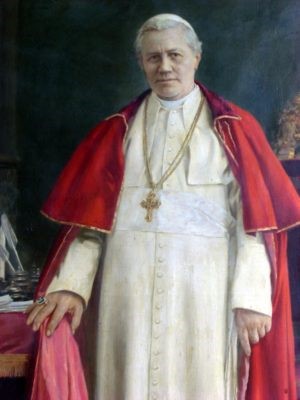– José Maria C.S. André
It is quite simple: “Whoever eats my flesh and drinks my blood has eternal life, and I will raise him up at the last day” (Jn 6:54).
Thanks to an unlikely Pope, these words of Jesus profoundly marked the Church from the early twentieth century onward. His feast is celebrated on the 21st August and so it is fitting to revisit now the background history.
To escape the Prussian invasion, Jan Krawiec and his wife Margherita była Włoszką left their native Poland (Wielkopolska) and settled in Italy, near Venice, in a village called Riese. Jan was renamed Giovanni and translated the surname Krawiec as Sarto (meaning tailor in Italian); the translation made perfect sense, because Jan Krawiec was actually a tailor by profession. The family was very poor, but very happy and very close. They had 10 children, one of whom was little Giuseppe (Joseph). His adventures were similar to those of many poor children: he walked 7 km barefoot to school, even when it was snowing and raining. When his countrymen raised a statue for him in Riese, they did not represent him as a Pope, but as they remembered him: a barefoot boy walking the road. When the story came to light after Giuseppe was elected Pope, the Vatican demystified the athletic proficiency of the Pope’s childhood, explaining that at the time, a lot of kids walked barefoot and it was fun. Fortunately, Giuseppe’s Polish stuff weathered the storms and the little one grew up happy, full of health and good humor, tall and blond like Poles use to be.
The academic marks have always been excellent in all subjects. Already in elementary school, when the master was absent, occupied in agricultural endeavors, little Giuseppe would take charge of the whole school, with great authority, as people say.
He felt called to priesthood and went to the seminary. Some time after, his father died –Giuseppe arrived in time to accompany him at the last moment– and with the death of the head of household, the Sarto found themselves in a delicate situation. In spite of the difficulties, the mother had the valor to sustain the house and Giuseppe continued in the seminary.
The following steps can be briefly summarized: ordained priest, sent for various parish duties, appointed bishop of Mantua, appointed Patriarch of Venice and Cardinal, and suddenly elected Pope, named Pius X. It is surprising that a son of foreigners, of such simple origin, became Pope in the early twentieth century and even more surprisingly the revolution that it unleashed.
The Eucharist deserves such a reverence that for centuries the faithful only dared to communicate on special occasions and the children were consider unworthy to receive Communion. In fact, St Paul warned the Corinthians: “Whoever eats the bread or drinks the cup of the Lord unworthily will be guilty of sinning against the body and blood of the Lord. But let a man examine himself, and so let him eat of that bread, and drink of that cup. For he that eats and drinks unworthily, eats and drinks judgment to himself, not discerning the Lord’s body” (I Cor 11:27-29). The warning could not be more severe: “That is why many of you are weak and sick and some have even died,” St. Paul says (I Cor 11:30).
Pius X, a charming character, of an enormous generosity to the poor, challenged a tradition of centuries. Certainly, those who communicate must be in the grace of God, but the Eucharist is an indispensable nourishment, because Jesus said: “Unless you eat the flesh of the Son of man, and drink his blood, you have no life in you” (Jn 6:53). Therefore, the solution is not to delay Communion, but go to Confession without wasting any more time.
The people realized that Pius X promoted Communion to strengthen the Church, not because the Eucharist was a banal thing. The Blessed Sacrament was so important to this Pope that only a few were scandalized. The Church understood his love for the Eucharist, canonized him and celebrates his feast every year on the 21st August.


 Follow
Follow


